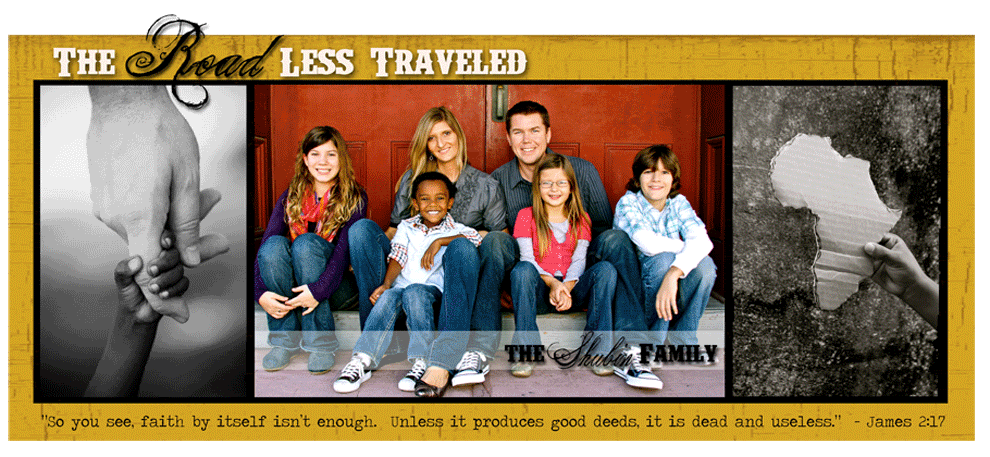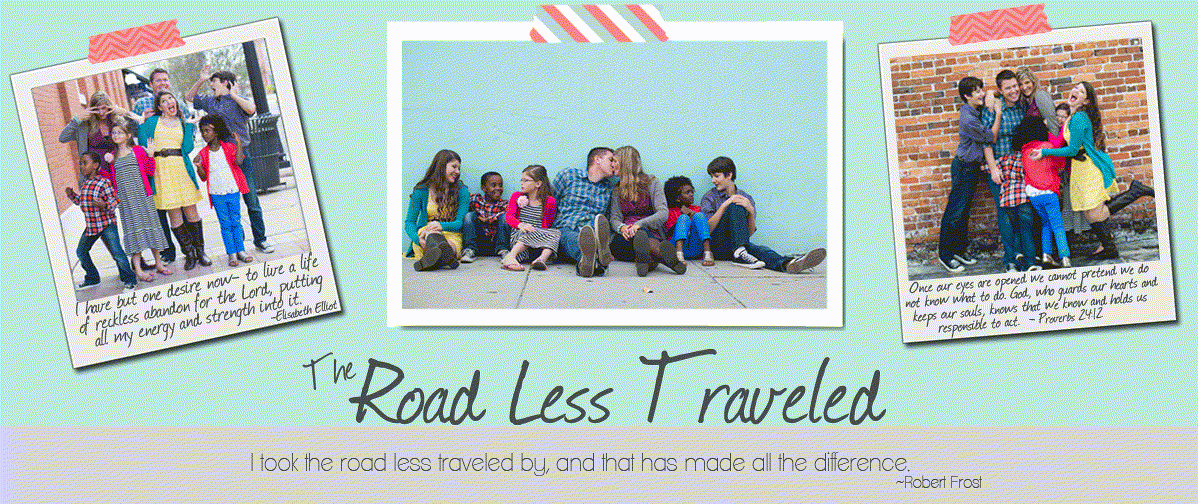As I read through my notes I was reminded of so much that I gleaned at the conference. I recently read a blog Kristen Howerton wrote about her experience at T4A. She put into words much of what I was feeling. I realize Christians are criticized because others think adoption is somehow all about our "rescue mission". I will tell you I'm not raising my son to think he's some rescued child from this horrible country. David and I are parenting him, loving him, and empowering him to be all that God created him to be. That's the only thing we can do as parents. He's not a charity case, none of our children are. He's an amazing blessing. If anything he's saved me from myself. I know that sounds weird but God allows circumstances to break us, to change us, to mold us. The adoption of our son changed us. Opened our eyes to so much more then our little life of living the American Dream.
I'm so very thankful.
I'm so very thankful.
I attended several break out sessions, many of them were with Dr. Karen Purvis. Dr. Purvis is the director of the Institute of Child Development at Texas Christian University. She has dedicated her life to developing biblical and research based interventions for at risk children. She's incredible. While I've read her book "The Connected Child" but hearing her in person was amazing. There were many things I felt we could implement in our parenting, it was enriching and empowering.
Not only is this incredibly helpful for adoptive parents but also for the extended families so they can understand why we parent our kids the way we do. For us we've just implemented changes across the board, it makes for a more fluid running of our home. There were even a few more things David and I talked about after I got home that we've since implemented as well.
Here's a few excerpts from my notes.
If you learned how to do a skill and then you lost it, you learn it again the same way you did the first time. As you go back to the beginning you recover.
Recovery of function recapitulates the development of function.
Pre-natal risk - Flight, fight, or freeze - brain awareness development even in utero can have this response. Giving voice is one of the most powerful things we can give our children. The ability to ask for their needs shows attachment. Recreate the environment and the child goes back to the beginning. Nursing....feeding.....meeting the need....hearing the voice. We should be doing a sensory activity every two hours for thirty minutes. Newborn, eight months, and beyond the touch is important. You give your child a heritage. Shame is what’s produced if the child didn’t get that.
We are an external modem to help the brain function in our child to develop. These children need to know they are precious, it tells our children who they are by the time we spend with them. If the child doesn’t get this brain development at a young age we have to download that information for them.
No matter what a child has done we must see them for the preciousness that they are. To tell a child that God hasn’t made a child quite like them. That He has a heritage for them. Orphaned kids want a mommy and a daddy’s blessing. They yearn to be told they are worth it. They have a heritage, they are worthy of love.
The heritage of a loved child = knowing they are loved and precious.
A child who has not had a mom and dad from the beginning will struggle, the brain will go crazy quicker. We are to be disciples to these children and fight for them. Love them and take them back to the beginning.
A child who lives in the amygdala portion of the brain lives in violence. It’s a life and death moment for them. Its a place they remain and HAVE to be in control stuck in fight, flight, or freeze. They turn to violence to maintain control. When children fall apart they go back to the loss. Embrace the child's grieving.
When we set this up we see dramatic changes in behavior, conversation, and abilities.
Regions of the brain are connected to feeling safe, love, and connected. Turn off the danger side of the brain and other areas improve. We are called to connect with our children, that is how God designed it. Parents must be trained, informed, and empowered.
For more information, free downloads, and more check out the links below.
www.empoweredtoconnect.org
www.child.tcu.edu
Empowering Our children through healing attachment relationships.
Empowering is for the body - hydrating, feeding every 2-3 hours for the first two years of having a new child in your home, saying yes 72 times an hour. Trust is built on consistent yes’ - getting creative for older children with our yes’ can be a challenge. Give it if you can. Find ways to build the yes’. We don’t let the children run us but also not in a home where the parents hold the children hostage. Optimal attachment occurs around 36 months. This process is a mutual family dance. You go where your child is going because in the beginning they cannot go where you are. Your child cannot dance with you until you meet them there. Pick your strategies well. You are teaching your child at 2,4,6,8,12, and 14 how to treat you as an adult.
All too often........Children from Hard Places
Have dramatic changes in trust, self-esteem, self-efficacy
Have confused thoughts and emotions about family and loss
Have survived harsh circumstances, creating maladaptive survival strategies and skills
Have dramatic changes in ability to process sensory input, in brain chemistry, insulin levels and brain development
When our kids feel shame they react. The less connected you are with your child and the harder you are on the child the more your child is going to buck. Connection and movement together. When we want to get through discipline we do it together, moving with me tucked under my wing in a loving nurturing relationship.
Gods commands demand respect. Don’t preach, put the child down, etc. Don’t allow disrespect, if a child is snotty you request that they try that again with respect. The situation turns from a negative no filled opportunity into a yes filled response.
A newborn earns trust with yes. (feeding, diapering, holding, etc) Its not an issue where you don’t demand respect.
Connected Discipline vs. Distancing Discipline
Time-in vs. Time-outs
Bringing the child closer vs sending him away
Resolution vs Consequences
Problem solving vs Lectures and sermons
Advocacy stance vs Adversary stance
Focus on the child's preciousness vs focusing on the child's failures
Parents are the external modem for the first three years of the child's life.
Gods relationship with us is pure, full of integrity, and transparent. Our children need to see us as their coaches not their warriors. If we’re coaches we can problem solve together, keeping in line with the parent child relationship but the goal being relational not controlling.
IDEAL Response
Immediate (launched within 3 minutes) (ex: hey buddy lets try that again)
Direct (with proximity and eye contact)
Efficient (a measured response)
Action-Based (opportunity for a re-do)
Leveled (at the behavior not at the child) (no yelling, no barking, no chastisement of the child but the behavior)
If the child kicks, screams, bites its a sign that they need to be more deeply connected to you. Deeply tucked under our wing. Keeping the child moving on the train with you, keeping closer to you. Find opportunities to say yes. It builds trust and fills their love tank. Child is more connected, the child succeeded and we got them there. The heart of God is to stick with us on this journey and that is our goal with our children as well. We can do incredible things with our children if we keep our eyes on the prize of a deep relationship just as God desires with us. We lead by example.
We must understand the depths of the journey
The goal is for the church to be the church to these children. It is a ministry of the church, not a cottage industry.













.JPG)








































6 comments:
One of the things that really challenged me in the Radical book is the idea of passing along what we learn instead of just jotting down a few personal applications, the idea of multiplying the blessing...that is what I thought of as I read your notes. Thank you for sharing what you gleaned from this conference with those of us who were not able to go.
Thanks so much for posting your notes from the conference. I soooo wish I could've made the trip. As a new adoptive mom to an older child, we're challenged in some of these areas right now. I appreciate your notes and links!!
Oh WOW
can you just come over for a few days to chat!!
sounded wonderful!! am reading Purvis book now!!
I just ordered some videos from Karen Purvis. I am excited.
Hope you have a good weekend! :) Shauna from http://www.trying2staycalm.com/
SO much awesome info! Thanks for putting it all down for us!
Post a Comment